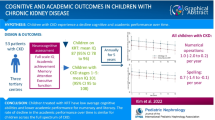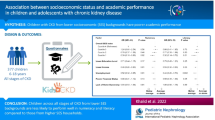Abstract
Although previous studies have documented neuropsychological deficits in children with end-stage renal disease, few have evaluated and compared the cognitive functioning and the school performance of children with renal failure. The current study evaluated the influence of chronic renal failure on cognitive functioning and school performance in children and adolescents with end-stage renal disease undergoing dialysis and after renal transplantation. Participants were given standardized IQ and achievement tests to assess cognitive functioning and ability. Academic performance was determined by evaluating grades for the semester in which the testing was performed; a grade point average (GPA) was calculated based on a 4.0-point scale. The 11 dialysis patients and 13 transplant patients were comparable in age, race, sex, and socioeconomic status. Overall IQ and subtest scores demonstrated no differences between the two groups. Performance on the Woodcock-Johnson achievement tests showed that the transplant patients did better on achievement tests of written language (P=0.04) and in school performance in English compared with dialysis patients (P<0.05). Furthermore the dialysis patients tended to be below age and grade level in all areas, whereas the transplant patients were achieving at or above these levels. There were significant differences in the age equivalent scores between the dialysis and transplant patients in the areas of mathematics and written language (P<0.05). However, when grades were evaluated there were no differences in overall GPA or in the mathematics GPA. Days absent were not different between the two groups. These data demonstrate that both groups of patients were of similar intellectual ability; the achievement of the dialysis patients was behind that of the transplant patients and this lag was not necessarily reflected in school grades. Patients with chronic renal failure should have cognitive and achievement testing on a regular basis, and areas of deficit should be addressed by the schools.
Similar content being viewed by others
References
Rutter M, Tizzard J, Whitmore K (1970) Education, health and behavior. Longman, London
Davis ID, Chang PN, Nevins TE (1990) Successful renal transplantation accelerates development in young uremic children. Pediatrics 86:591–600
Bock GH, Conners K, Ruley J, Samango-Sprouse CA, Conry JA, Weiss I, Eng G, Johnson E, David CT (1989) Disturbances of brain maturation and neurodevelopment during chronic renal failure in infancy. J Pediatr 144:231–238
Trompter RS, Polinsky MS, Andreoli SA, Fennell RS (1986) Neurologic complications of renal failure. Am J Kidney Dis 7: 318–322
Fennell RS, Fennell EB, Carter RL, Mengs EL, Klauser AB, Hurst JR (1990) A longitudinal study of the cognitive function of children with renal failure. Pediatr Nephrol 4:11–14
Fennell R, Fennell E, Randolph L, Mings E, Klausner A, Hurst J (1990) Association between renal function and cognition in childhood chronic renal failure. Pediatr Nephrol 4:16–20
Hobbs SA, Sexson SB (1993) Cognitive development and learning in the pediatric organ transplant recipient. J Learn Disabilities 26: 104–113
So SKS, Chnag P, Najarian JS, Mauer SM, Simmons RL, Nevins TE (1987) Growth and development in infants after renal transplantation. J Pediatr 110:343–350
Rasbury W, Fennell R, Morris M (1983) Cognitive functioning of children with end-stage renal disease before and after successful transplantation. J Pediatr 102:589–592
Fennell RS, Rasbury WC, Fennell EB, Morris MK (1984) The effects of kidney transplantation on cognitive performance in a pediatric population. Pediatrics 74:273–278
Wechler D (1981) Manual for the Wechler Adult Intelligence Scale — revised. The Psychological Corporation, New York
Woodcock RW, Johnson MB (1990) Woodcock-Johnson Psychoeducational battery — revised. DLM Teaching Resources, Allen, Texas
Wechsler D (1974) Manual for the Wechsler Intelligence Scale for Children — revised. The Psychological Corporation, San Antonio
Achenbach TM, Edelbrock C (1986) Manual for the Teacher's Report Form and the Teacher Version of the Child Behavior Profile. University of Vermont, Department of Psychiatry, Burlington
Achenbach TM, Edelbrock C (1983) Manual for the Child Behavior Checklist and revised Child Behavior Profile. University of Vermont, Department of Psychiatry, Burlington
Achenbach TM, Edelbrock C Manual for the Youth Self-Report and Profile. University of Vermont, Department of Psychiatry, Burlington
Sattler J (1992) Assessment of children revised and updated, 3rd edn. Sattler, San Diego
Foley CM, Polinsky MS, Gruskin AB, Baluarte HJ, Grover WD (1981) Encephalopathy in infants and children with chronic renal disease. Arch Neurol 38:656–658
Geary DF, Fennell RS, Andrioloa M, Gudat J, Rodgers AM, Richard GA (1980) Encephalopathy in children with chronic renal failure. J Pediatr 97:41–44
Miller LC, Bock GH, Lum CT, Najarian JS, Mauer SM (1982) Transplantation of the adult kidney into the very small child: longterm outcome. J Pediatr 100:675–680
McGraw MS, Haka-Ikse K (1985) Neurologic-developmental sequelae of chronic renal failure in infancy. J Pediatr 106:579–583
Cohen NJ, Gotlieb H, Kershner J, Wehrspann W (1985) Concurrent validity of the internalizing and externalizing profile patterns of the Achenbach Child Behavior Checklist. J Consult Clin Psychol 53:724–728
Author information
Authors and Affiliations
Rights and permissions
About this article
Cite this article
Lawry, K.W., Brouhard, B.H. & Cunningham, R.J. Cognitive functioning and school performance in children with renal failure. Pediatr Nephrol 8, 326–329 (1994). https://doi.org/10.1007/BF00866349
Received:
Revised:
Accepted:
Issue Date:
DOI: https://doi.org/10.1007/BF00866349




